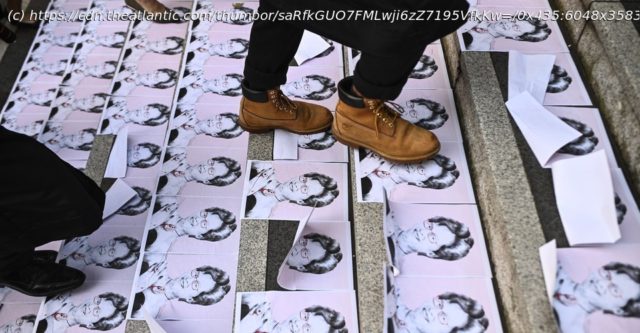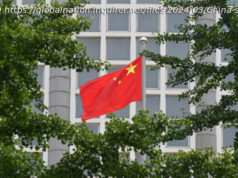The authorities insist freedoms will be upheld. Their actions show otherwise.
As Hong Kong began to absorb the gravity of a new national-security law forced upon it by Beijing, Carrie Lam, Hong Kong’s chief executive, told a reporter that the city’s residents needn’t worry. The city’s Basic Law, its mini-constitution, she said last month, “clearly stated” that the “people of Hong Kong should be able to continue to enjoy the freedom of speech, freedom of press, of publications, protest, assembly and so on.” Lam was reiterating what she had told the United Nations a day earlier. But today, Jimmy Lai, a media tycoon who runs the popular prodemocracy newspaper Apple Daily, was arrested at his home and perp-walked by police through his own newsroom, his hands handcuffed behind his back as dozens of officers swarmed the building, rummaging through files and reporters’ desks. Lai was detained, along with at least nine others, on allegations that he had breached the national-security law by colluding with foreign forces, police said. The charge carries a maximum sentence of life imprisonment. Lam’s statements—and the Hong Kong government’s actions—during the height of the city’s prodemocracy protests last year struck those supportive of the movement as half-measures that came too late to defuse the political crisis at best, and arrogant and uncaring at worst. But with the national-security law in place, her words have at times appeared completely unmoored from the realities unfolding in the city. Lai’s arrest thus served a dual purpose, at once confirming the worst fears about the national-security law’s impact on Hong Kong’s long tradition of maintaining a free press, and offering the latest instance in which Lam’s public remarks seem utterly empty. “This is an outrageous assault on press freedom, on a number of levels,” Keith Richburg, the director of the Journalism and Media Studies Centre at the University of Hong Kong and a former Hong Kong and Beijing bureau chief for The Washington Post, told me as the arrest unfolded. The arrest is also an accelerant to the rapid erosion of trust between Hong Kong’s leaders and its people.Last year, as police deployed heavy-handed tactics to quell street protests, trust in the force, once unironically dubbed “Asia’s Finest,” plummeted. A similar popular distrust has grown toward Hong Kong’s government, thanks in large part to Lam’s continuous doublespeak, her top officials’ unquestioning support, and Beijing’s hostile maneuvers. This distrust is now corrosively permeating the court system, the justice department, and the business community, weakening the territory’s core foundations and international appeal, to say nothing of the safety of its residents. The new law has “worsened the trust deficit,” Surya Deva, an associate professor at the City University of Hong Kong’s law school, told me. It is, he added, “becoming clearer that the chief executive is mostly a front for Beijing authorities to operationalize their thinking.” The erosion of the city’s rights and freedoms has proceeded at an alarming rate in recent weeks: Lam had, for example, unequivocally declared that the national-security law would not be retroactive—allowing, she said, the territory to have a fresh, conflict-free start—only weeks before a dozen prodemocracy candidates were barred from partaking in an election due next month. Officials responsible for screening the candidates often cited candidates’ public comments and months-old social-media posts, made before the national-security law existed, as evidence that they would not do their duty in upholding it or the Basic Law more broadly.






